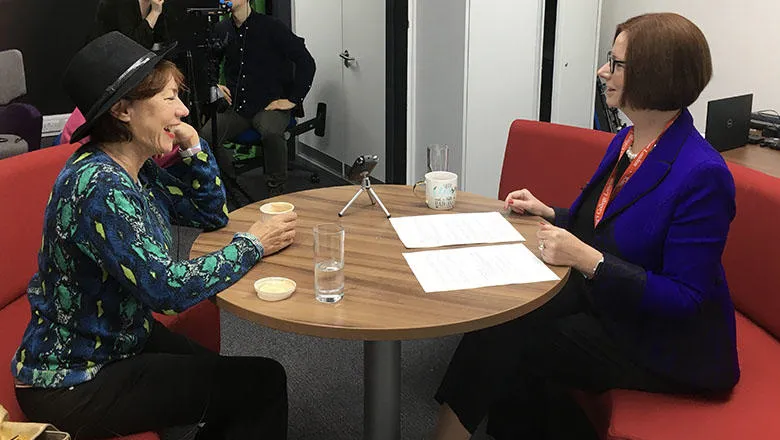27 June 2019
"Every woman who doesn't call herself a feminist, has kept her Wonderbra and burnt her brain." Kathy Lette talks to Julia Gillard
Australian-British bestselling author Kathy Lette talks “chick lit”, motherhood and why it benefits men to do more housework in a new podcast episode.

Australian-British bestselling author Kathy Lette talks “chick lit”, motherhood and why it benefits men to do more housework, with Julia Gillard in a new podcast episode.
Lette is the second guest to feature on A Podcast of One’s Own,following Sandi Toksvig. An outspoken comic writer and pioneering voice in contemporary feminism, Lette believes her role as a writer is to lift up her reader, by dealing with life’s difficulties - including all the issues women face, in a humorous, confessional style which draws on her and her friends' lived experiences. It’s an approach that has earned her books the label “chick lit”, – a term she vehemently rejects:
“Men who write first-person, funny, contemporary fiction get compared to Chekhov, people like Nick Hornby…he gets ‘Chekovian lit’ and we get ‘chick lit.’”
And it’s not just the label she objects to, it’s also the way women writers are treated by the publishing industry, more often than not, getting the “pink cover with the cupcake on it” even when their writing might be dealing with serious issues, as she explains: “it’s a way of putting you back in your box.”
Despite leaving school aged 16, “the only examination I’ve ever passed is my cervical smear test”, Kathy became a self-taught writer “because it’s cheaper than therapy”, penning, with her friend Gabrielle Carey, the Australian cult classic Puberty Blues, which catapulted her from “obscurity to notoriety overnight”.
Writing enabled her to expose the degrading misogyny she and her peers faced on a daily basis, growing up in 1970s Sydney. At its most extreme, Kathy and her peers were made to cut out the names of their “surfy boy” boyfriends in paper, stick them to their stomachs and then sunbathe, so that they’d get a tan tattoo in the shape of the boy’s name.
Her writing also kickstarted her feminism and her desire to educate readers on the topic through humour:
“I always try and disarm with charm ... if you can make the reader laugh you’re much more likely to get them to relax into your message.”
For Lette books are “a very powerful tool” in promoting feminism. Sometimes this means letting women readers know they’re not alone, in the myriad of challenges they face from periods, to motherhood, mastitis, and then the menopause. But it also works for men too, as Lette notes: “male readers can get inside the head of a woman and imagine how belittling and degrading and brutal the world can be.”
Unlike women writers of the past, such as Virginia Woolf, George Elliott, Simone de Beauvoir and Edith Sitwell who “gave birth to books rather than babies”, Lette has drawn on her experience of motherhood as rich material for her books.
She talks to Gillard about how she came to write Mad Cows, the biggest international success of her career:
“I wanted to take the idea that motherhood was the ultimate fulfilment for females, that great big sacred cow, and whack it on the barbie, because it’s really hard yakka…Some days I was so bored doing creative things with Playdo, I could see my plants engaging in photosynthesis…You get seated downtable at dinner parties, people take 100 IQ points off you. I think the only way mums…can get more respect is to change their role to ‘domestic engineer.’”
In Lette’s view, equality still has a long way to go including for equal pay, “there’s only one place size does count – bank balance” she believes women are “still getting concussion hitting our heads on the glass ceiling and we’re supposed to clean it while we’re up there.”
The episode closes with a discussion between Lette and Gillard on how having more women in positions of power could make all the difference in the fight for equality:
“Why can’t we have a ‘guest edit’ of the world? Just let women take over the world for 6 months, we can’t do a worse job than the boys have done.”
You can find Julia Gillard’s new podcast series A Podcast of One’s Own on all the main podcast hosting platforms. Sandi Toksvig featured as guest on the first episode, and subsequent episodes will be released regularly and will feature women leaders from the worlds of business, media, entertainment, activism and other fields.
